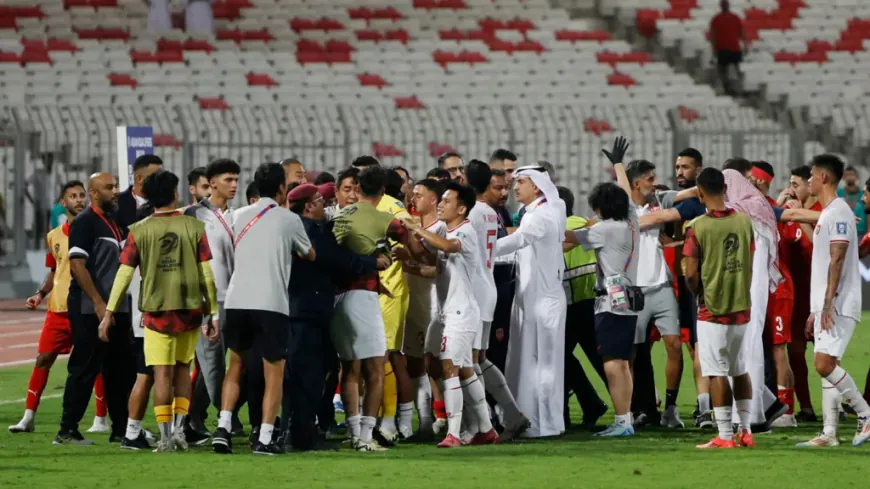Bahrain's Decision to Cancel Football Match in Indonesia Cited for Safety Reasons
Implications of Bahrain's Decision Should the BFA's appeal to have the match moved be denied and Bahrain ultimately refuses to participate, Indonesia would automatically receive a 3-0 victory due to a forfeit. This scenario highlights the significant consequences that can arise from off-field issues and fan behavior, particularly in regions where football-related violence and unrest have been prevalent. Indonesia has a troubling history of crowd violence within its football culture, with authorities often struggling to manage rivalries between fan groups. A particularly tragic incident occurred two years ago when 125 people lost their lives in a stadium disaster during a match in Malang, triggered by a pitch invasion. This history underscores the gravity of Bahrain's concerns for the safety of its players.

In a significant turn of events, Bahrain's national football team has announced that it will not participate in a World Cup qualifying match scheduled to take place in Indonesia due to concerns regarding the safety of its players. This decision follows a distressing episode of online threats directed at the team by Indonesian fans after a controversial 2-2 draw between the two teams last week.
Context of the Controversy
The incident that triggered this turmoil occurred during a heated match where Bahrain managed to equalize in the dying moments—specifically, in the 99th minute—leading to outrage among Indonesian players and supporters. The controversy stemmed from the fact that the match officials had indicated a mere six minutes of added time, yet Bahrain scored after nine minutes had passed, igniting protests from the Indonesian side. One Indonesian player had to be restrained and ultimately sent off during the chaotic aftermath.
The Indonesian Football Association (PSSI) voiced its grievances, claiming that the Omani referee, Ahmed Al Kaf, had intentionally extended the added time to favor Bahrain. The PSSI's executive member, Arya Sinulingga, expressed discontent with the officiating, stating that it appeared as though the referee was attempting to prolong the match merely to enable Bahrain to score.
Death Threats and Security Concerns
Following the match, the fallout escalated with a deluge of online harassment aimed at Bahraini players, including death threats posted on social media. This hostile environment prompted the Bahrain Football Association (BFA) to respond with serious concern. In a statement released on Instagram, the BFA expressed its astonishment at the threats, condemning the behavior of certain Indonesian fans and emphasizing that such actions do not reflect the values or principles of Islam.
In light of these developments, the BFA formally requested that FIFA relocate the upcoming return match, scheduled for March next year in Jakarta, to a safer venue outside Indonesia. As of now, both the Indonesian Football Association and FIFA have not publicly responded to this request.
Implications of Bahrain's Decision
Should the BFA's appeal to have the match moved be denied and Bahrain ultimately refuses to participate, Indonesia would automatically receive a 3-0 victory due to a forfeit. This scenario highlights the significant consequences that can arise from off-field issues and fan behavior, particularly in regions where football-related violence and unrest have been prevalent.
Indonesia has a troubling history of crowd violence within its football culture, with authorities often struggling to manage rivalries between fan groups. A particularly tragic incident occurred two years ago when 125 people lost their lives in a stadium disaster during a match in Malang, triggered by a pitch invasion. This history underscores the gravity of Bahrain's concerns for the safety of its players.
The Broader Picture
The ongoing tensions between Bahrain and Indonesia extend beyond this recent match. In 2012, a previous World Cup qualifying encounter between the two nations ended in a shocking 10-0 victory for Bahrain, raising suspicions of match-fixing. At that time, Bahrain required a substantial margin to advance in the qualifying stages, prompting FIFA to launch an investigation. However, both teams were ultimately cleared of any wrongdoing.
Currently, Bahrain, ranked 76th in the world, is preparing for their next World Cup qualifying match against China. Meanwhile, Indonesia, positioned at 129th, will face Japan in November. The contrasting trajectories of the two teams in the international football landscape make this incident particularly noteworthy.
Looking Ahead
As the footballing community watches closely, the implications of Bahrain's decision and the ongoing discussions surrounding fan behavior, security, and officiating standards will likely remain in focus. The BFA’s plea for safety reflects a growing acknowledgment of the need for better protection of players and officials in international football, particularly in regions with a history of violence and unrest.
Both teams now find themselves at a crossroads, where the actions taken in the wake of this incident could significantly influence their reputations and future interactions on the global stage. The upcoming months will reveal whether Bahrain’s concerns will be addressed adequately, and how both teams will navigate the fallout from this tumultuous encounter.
In conclusion, Bahrain's withdrawal from the scheduled World Cup qualifying match in Indonesia is a serious reflection of the challenges faced in international football, particularly in regions marked by fan violence and controversy. As both nations prepare for their respective future fixtures, it remains to be seen how the repercussions of this incident will play out, not only in terms of safety but also in the broader context of international sportsmanship and relations. The situation serves as a stark reminder of the sometimes perilous intersection of sports and politics, and the ongoing need for vigilance and respect within the beautiful game.





















































